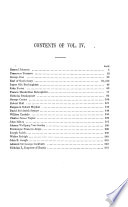 | 1852 - 634 pages
...lecturer, as sure as fate, a rebuke, though from young lips, that would have made his old face blush. " He who would not be frustrate of his hope to write well hereafter in landable things, ought himself to be a true poem :" — fancy that sentence — an early and often... | |
 | Samuel Taylor Coleridge - 1853 - 440 pages
...good man. Dedication to the Fox.* Ben Jonson has borrowed this just and noble sentiment from Strabo. * "He who would not be frustrate of his hope to write well hereafter iu laudable things ought himself to be a true poem — that is a composition and pattern of the best... | |
 | Biographical magazine - 1853 - 586 pages
...us hear what our great poet has to say on this point. "He, who would aspire to write well hereafter, ought himself to be a true poem — that is, a composition and a pattern of the best and honourablest things — not presuming to sing high praises of high men and... | |
 | Thomas Keightley - 1855 - 518 pages
...sublime and pure thoughts, without transgression. And long it was not after when I was confirmed in this opinion, that he, who would not be frustrate of his...and honourablest things, — not presuming to sing * ie most inclined to love, and to light and amorous reading. f It certainly must have been by a peculiar... | |
 | Thomas Keightley - 1855 - 512 pages
...sublime and pure thoughts, without transgression. And long it was not after when 1 was confirmed in this opinion, that he, who would not be frustrate of his...that is, a composition and pattern of the best and houourablest things, — not presuming to sing * »'. e. most inclined to love, and to light and amorous... | |
 | 1855 - 326 pages
...that ever adorned humanity with wealth of wit and words of wisdom.* Milton has prettily observed : ' He who would not be frustrate of his hope to write...true poem ; that is, a composition and pattern of the honourablest things.' In few cases, we firmly believe, has the truth of this principle met with a fitter... | |
 | John Milton - 1855 - 900 pages
...Primum ipsi tibi. Milton with great depth of judgment observes, in his " Apology for Smectymnuus," that, " he who would not be frustrate of his hope to write well in laudable things, ought himself to be a true poem, that is, a composition of the best and honourablest... | |
 | David Masson - 1856 - 494 pages
...lecturer, as sure as fate, a rebuke, though from young lips, that would have made his old face blush. " He who would not be frustrate of his hope to write...laudable things, ought himself to be a true poem:" — fancy that sentence — an early and often pronounced formula of Milton's, as we may be sure it... | |
 | John Bartlett - 1856 - 660 pages
...bright countenance of truth in the quiet and still air of delightful studies. Apology for Smectymnuss. He who would not be frustrate of his hope to write...laudable things, ought himself to be a true poem. Tract of Education. I shall detain you no longer in the demonstration of what we should not do, but... | |
 | Henry Barnard - 1856 - 768 pages
...of Lycidas and Comus ; and above all, moulding and consolidating his own character and life into " a true poem ; that is, a composition and pattern of the best and honorablest things." Of this period of his life, in his apology, Milton says, — "My morning haunts... | |
| |